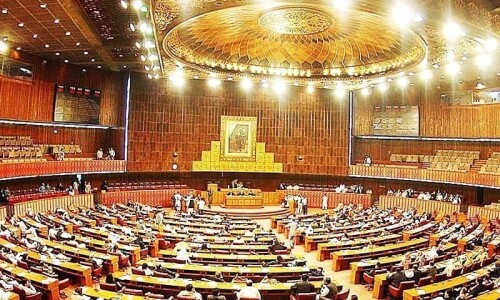MOSCOW, Feb 14: Soviet veterans marking 20 years since their defeat in Afghanistan warned the United States it would never truly control the country, citing bitter memories of a fiercely proud people and unforgiving landscape.
The withdrawal of the last Soviet troops from Afghanistan in February of 1989 ended a decade of fighting that killed an estimated 15,000 Soviet troops and convinced a generation of soldiers they had been sent to fight a war they could not win.
The United States, preparing to pour more troops into Afghanistan to fight a growing Taliban-led insurgency, is reliving their nightmare, they said.
“It’s like fighting sand. No force in the world can get the better of the Afghans,” said Oleg Kubanov, a stocky 47-year-old former officer with the Order of the Red Star pinned to his chest at an anniversary concert in Moscow.
“It’s their holy land, it doesn’t matter to them if you’re Russian, American. We’re all soldiers to them.”
Thousands of veterans, some in dress suits, some in combats, gathered on Friday for a lavish concert organised by Moscow City Hall. As they embraced and posed for pictures before the show, many cited America’s troubles as proof their campaign in Afghanistan had been hopeless from the start.
Reports that President Barack Obama plans to boost US forces there to 60,000 revived bitter memories for members of the Soviet deployment that steadily climbed to a peak of more than 100,000 troops as the insurgency deepened in the mid-1980s.
There are 36,000 US troops in Afghanistan today, split between the 55,000-strong Nato force and separate US missions, both charged with protecting a transitional government from Taliban forces.
“Numbers don’t solve anything,” said Shamil Tyukteyev, 59, who led a regiment in Afghanistan from 1986-88. “You can’t put a soldier outside every house or a base on every mountain. We saw it ourselves, the more troops, the more resistance.”
Soviet tanks and troops rolled into Afghanistan in 1979 to prop up a puppet Communist government in Kabul. But hopes of a swift victory were dashed as Soviet forces found themselves bogged down in a guerrilla war waged by a fierce Mujahideen force that was backed by US arms and money and had access to bases in neighbouring Pakistan.
After a decade of pouring in more and more troops and money, Soviet leader Mikhail Gorbachev ordered a withdrawal in 1989.
“They’ll send more in and they’ll lose more,” Andrei Bandarenko, 42, a former special forces officer, said of the US plans. “What does Obama know about the situation on the ground? We had our own fool who knew even less.”
Two decades on, Bandarenko is still bitter at being forced to withdraw through the mountains in mid-winter temperatures of minus 27 degrees Celsius — a trip he sketched for friends on a commemorative map pinned to the wall of the concert hall.
The Soviet military leadership, he said, never came to terms with the difficulties of fighting a native force in barren mountains where temperatures could dive from 40 degrees Celsius to freezing within hours.
Like the US, the Soviet Union tried to mould Afghanistan into a unified state, papering over an ancient web of tribal and ethnic rivalries, he said. “There is no common language between the ethnic groups, between the clans,” he said. “They are impossible to control.”—Reuters















































Dear visitor, the comments section is undergoing an overhaul and will return soon.